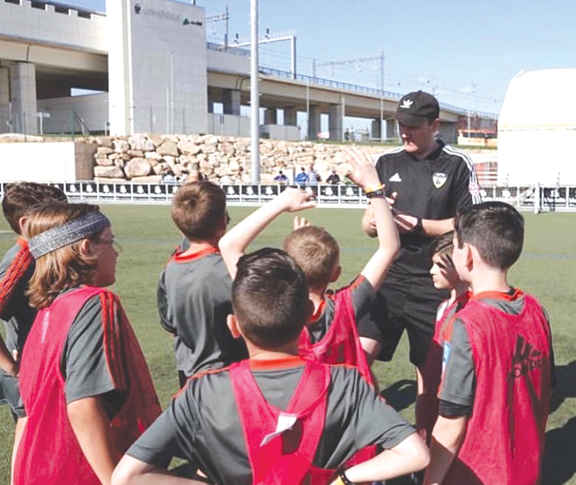
Kurtis Millan, with his 10-year-old boys, in Spain for a tournament playing against Spanish academy teams.
By Brandon HENSLEY
While definitive strides have been made in the United States when it comes to soccer, there are still moments when Kurt Millan sits back and laments the American approach to the game. In the Irishman’s eyes, impatience is still a problem area when it comes to truly appreciating what people around the globe call “the beautiful game.”
Here’s an anecdote: While recently coaching one his squads for Global Premier Soccer, Millan found his boys in possession of a 3-0 lead. Because of the cushion, he thought this would be a good time to teach strategy. He called for them to change their defensive scheme, to play compressed and in a tighter formation. Unfortunately, one the parents yelled out, “Press!” and the son of the parent broke away from his team and charged forward, leaving an open gap and a lane for the other team to shoot.
“It’s always go get the ball, go get the ball” Millan sighed. Tom Petty used to sing that waiting was the hardest part. Millan wants to change that and to get his clubs to know about soccer what he already knows: Sometimes the team without the ball is in control.
Control has been a theme in Millan’s life for several years. As the California general manager of GPS, a soccer organization that has ties in 22 states, Millan has since acquired majority control of Crescenta Valley Soccer Club and made it part of the California GPS franchise. In 2016 Crescenta Valley’ founder, Reggie Rivas, was looking for help, overloaded by commitments that became too much.
“We had 400-500 players relying on him,” Millan said of Rivas, who remains as a consultant and part-time director. Rivas agreed to merge his club with GPS in 2018 and Millan and his crew became full operations in January of last year.
The league aims to bring soccer culture to the states that has thrived in places like England and South Africa. Millan, Los Angeles-area coach and director Drago Kazokov and director of marketing Matt Bambrick all agree America’s thirst for sports in almost unmatched, but refining its understanding for soccer still remains.
Much of this has come from generations of soccer moms and dads without qualification who volunteer as coaches and subsequently aren’t passing down the correct mentality for would-be soccer stars.
“If you’re a coach and understand the game, then you can actually teach it,” Kazokov said. “You’re relying on these adults to teach the game – no wonder they don’t understand or don’t want to play.”
Kazokov and Millan’s tone isn’t condescending when they speak about this, and they recognize the impact Rivas’ organization has had on the community since it was founded in 2001. Rivas wanted more resources, including people who could bring over the right kind of curriculum for its teams, but Millan wasn’t about to change everything just because he was now in charge.
“That’s been [an influence] on what my decision-making: is this still in line with how Crescenta Valley Soccer Club is run?” he said.
The staff hasn’t entirely changed as CVHS boys’ coach Grant Clark and Falcons’ girls’ assistant Jorden Schulz remain as coaches, further demonstrating the club’s awareness for consistency.
“It’s not about coming in and saying, ‘Alright, everything you’ve done the past 19 years is out the window.’ That’s not what we believe in; it’s about trying to take what works and make it better, and what didn’t work – move away from it,” Kazokov said.
The club’s office is just off Verdugo Road in North Glendale and, as Bambrick said, its shades are always open and the guys are ready with pastries for guests. It’s about being as open and transparent to the residents as they can be.
Like Millan, Bambrick is from overseas (Birmingham, England) and Kazokov is Bulgarian but born in Portugal, and spent his childhood in South Africa.
It’s that kind of global experience the club is looking to instill in every new player who comes into one of its 45 teams. The club is partners with FC Bayern Munich in Germany, which allows GPS teams to travel overseas and receive instruction from guest coaches and players. Locally, the Major League Soccer team LA FC has its own academy, which is something players in GPS can hopefully strive to be accepted into.
“If we try to be what we say we are, we’re a stepping stone,” Millan said. “If we can have players go to an academy like LA FC, we’ve done our job.”
“It’s not about making pros,” Bambrick added. “It’s about getting kids to fall in love with the game, and provide a culture of soccer that kids in America have probably missed out on.”
